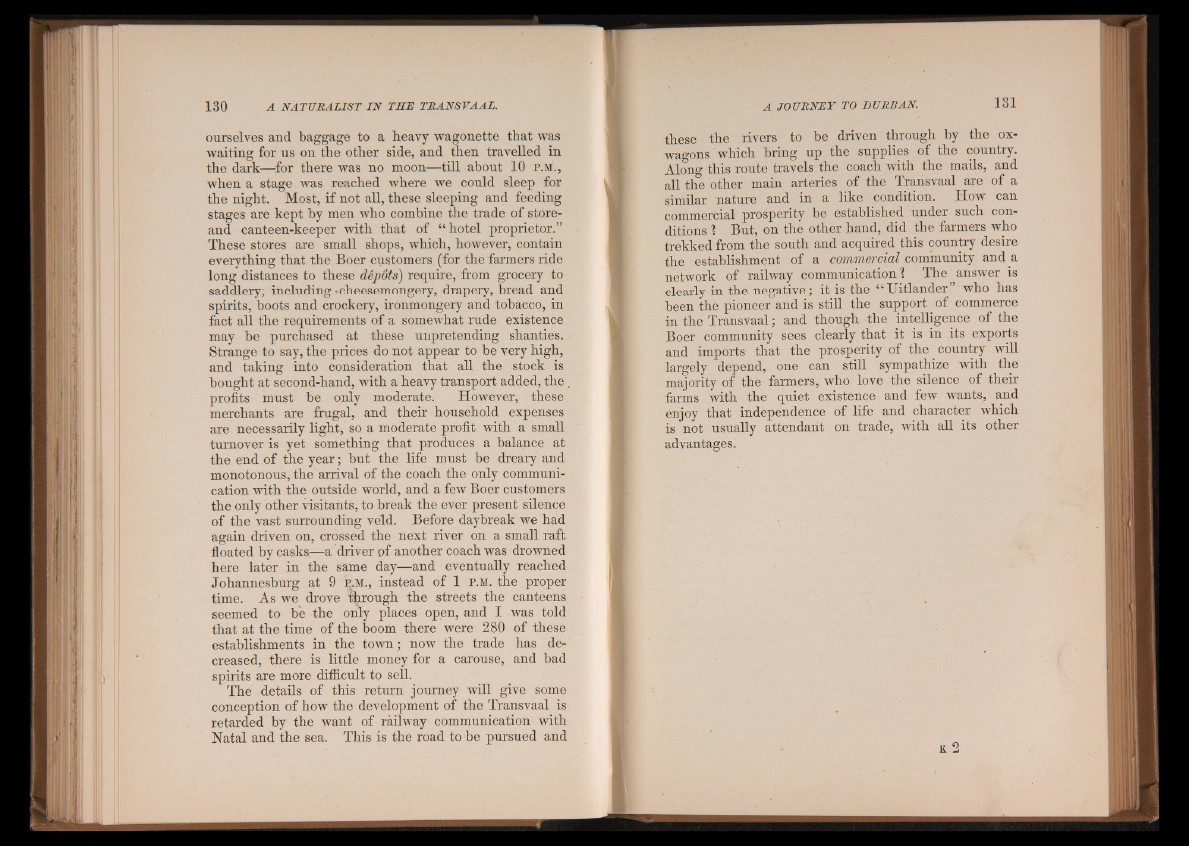
ourselves and baggage to a beavy wagonette that was
waiting for us on the other side, and then travelled in
the dark—for there was no moon—till about 1 0 p .m.,
when a stage was reached where we could. sleep for
the night. Most, if not all, these sleeping and feeding
stages are kept by men who combine the trade of store-
and canteen-keeper with that of “ hotel proprietor.”
These stores are small shops, which, however, contain
everything that the Boer customers, (for the farmers ride
long distances to these dépôts) require, from grocery to
saddlery, including -cheesemongery, drapery, bread and
spirits, boots and crockery, ironmongery and tobacco, in
fact all the requirements of a somewhat rude existence
may be purchased at these unpretending shanties.
Strange to say, the prices do not appear to be very high,
and taking into consideration that all the stock is
bought at second-hand, with a heavy transport added, the
profits must be only moderate. However, thèse
merchants are frugal, and their household expenses
are necessarily light, so a moderate profit with a small
turnover is yet something that produces a balance at
the end of the year; but the life must be dreary and
monotonous, the arrival of the coach the only communication
with the outside world, and a few Boer customers
the only other visitants, to break the ever present silence
of the vast surrounding veld. Before daybreak we had
again driven on, crossed the next river on a small raft
floated by casks—a driver of another coach was drowned
here later in the same day—and eventually reached
Johannesburg at 9 'EM ., instead of 1 p .m. the proper
time. As we drove through the streets the canteens
seemed to be the only places open, and I was told
that at the time of the boom there were 280 of these
establishments in the town; now the trade has decreased,
there is little money for a carouse, and bad
spirits are more difficult to sell.
The details of this return journey will give some
conception of how the development of the Transvaal is
retarded by the want of railway communication with
Natal and the sea. This is the road to be pursued and
these the rivers to be driven through by the ox-
wagons which bring up the supplies of the country.
Along this route travels the coach with the mails, and
all the other main arteries of the Transvaal are of a
similar nature and in a like condition. How can
commercial prosperity be established under such conditions
1 But, on the other hand, did the farmers who
trekked from the south and acquired this country desire
the establishment of a commercial community and a
network of railway communication? The answer is
clearly in the negative; it is the “ Uitlander” who has
been the pioneer and is still the support of commerce
in the Transvaal ; and though the intelligence of the
Boer community sees clearly that it is in its exports
and imports that the prosperity of the country will
largely depend, one can still sympathize with the
majority of the farmers, who love the silence of their
farms with the quiet existence and few wants, and
enjoy that independence of life and character which
is not usually attendant on trade, with all its other
advantages.